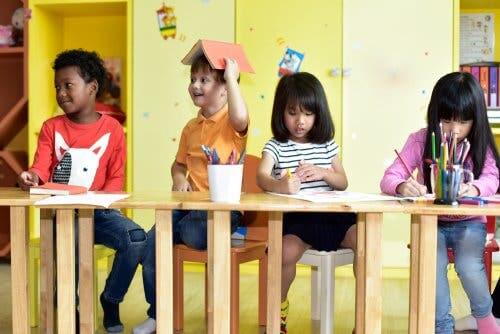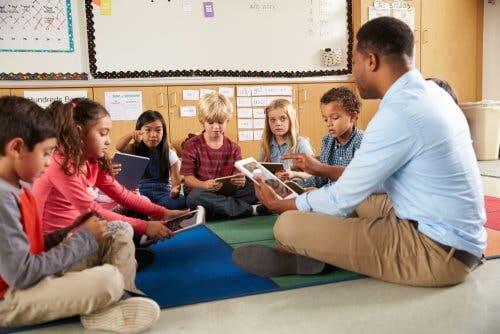How to Prepare Your Child to Start Preschool

Today, you’re going to learn how you can prepare your child to start preschool. If your child is going to start preschool soon, you may feel conflicting emotions.
Among these emotions, you probably feel enthusiastic about all the fun you think your child will have and the new friends they’ll make. But, at the same time, you may feel a little sad because your baby is going out into the world without you. This is very normal. Remember that you aren’t the only one who’s feeling new things during this stage!
Your child will also have to deal with many new feelings as they reach this transition. They’ll feel proud to be an older child who can go to class but, at the same time, they’ll feel concerned about being separated from their parents and starting something unfamiliar.
Below, discover what you can do as a parent to make this big transition easier for your child because it is possible to prepare your child to start preschool!
Prepare your child to start preschool in a fun way
You can do many things in the weeks leading up to the big day to prepare them for it. Here are some ideas to make fun the focus of the preparation process.
Use pretend play to explore the idea of preschool
Take turns being parents, children, and teachers. Practice new common daily routines, such as saying goodbye to mom or dad, taking off their coat, singing songs, reading stories, spending time sitting in a circle, playing outside, and napping.

This way, you’ll make your child see that preschool is a good place, where they’ll have fun and learn. You must patiently answer their questions. This helps the child feel they have more control over things and reduces their anxiety.
Read about how to prepare your child to start preschool and read with them
In the library, you can find many books that can help prepare your child for preschool. Some are even for children, meaning you can read them with your child! For example, Emma Goes to School is a story by Susie Morgenstein that tells the story of a girl who goes to school for the first time and how she manages to overcome her parents’ absence.
Likewise, What to Expect at Preschool by Heidi Murkoff is a beautiful book that helps children who are starting preschool with Angus, the lovable Answer Dog. Talk to your child about the stories, how the characters feel, and also about how they feel about the idea of starting preschool.
Play a game to practice self-help skills
These skills allow the child to satisfy their own needs and carry out activities and behaviors that end up leading to their independence. These include opening their coat’s zipper or buttons, hanging their jacket on a hook, putting on their backpack, or buttoning their shoes.
You can do it like it’s a game. For example, run a kind of race with them to see which of the two can tie their shoes faster. It’s kind of like playing “When you go to school.” Make your child take off their coat or close the zipper of their backpack.
Visit your child’s preschool classroom if possible
You must inform yourself when it’s possible to visit your child’s new school. If possible, even play with your child on the playground sometime before school starts. These visits will boost their comfort and confidence in this new environment.
Concerns and observations regarding preparing your child to start preschool
Talk to them
Your child might have some questions or concerns about what starting preschool is going to be like. The key strategy is simple: listen to their concerns and talk to them.
It’s important to let them know that their concerns have been heard. It doesn’t matter if the concerns are big or small, as children’s concerns about preschool can significantly influence their experience there. Will you remember to pick them up when school’s out? Will their teacher be nice and friendly?

Explain to your child that it’s normal for them to feel happy, sad, scared, excited, or worried. You should let them know that starting something new can be scary and that many people feel that way. It can be helpful to share a personal experience when you started something new and tell them how you felt.
About non-verbal messages
Although most three-year-olds can talk, most are still unable to fully explain how they feel or what they’re concerned about. They may manifest their concerns in behavior changes, meaning you can see them withdrawing or being more aggressive.
Another common reaction in some children is regression. For example, a child who’s fully potty trained may start having accidents.
You must avoid your frustration if this happens and remember that your child is facing a great change in their life. Maybe they just need you to support them, take care of them, and be patient when these things happen while the transition is taking place.
Finally, here are some tips for the night before they start preschool:
- Answer any last-minute questions your child may have.
- Let your child choose their clothes (appropriate for the weather and for school) for their first day.
- Make sure your child goes to bed early. Choose a bedtime that allows your child to get a good night’s sleep before the first day.
And that’s it! By following these simple and logical guidelines, you’ll be prepared to face this new stage of your child’s life in a calm and simple way, with the least possible stress.
Today, you’re going to learn how you can prepare your child to start preschool. If your child is going to start preschool soon, you may feel conflicting emotions.
Among these emotions, you probably feel enthusiastic about all the fun you think your child will have and the new friends they’ll make. But, at the same time, you may feel a little sad because your baby is going out into the world without you. This is very normal. Remember that you aren’t the only one who’s feeling new things during this stage!
Your child will also have to deal with many new feelings as they reach this transition. They’ll feel proud to be an older child who can go to class but, at the same time, they’ll feel concerned about being separated from their parents and starting something unfamiliar.
Below, discover what you can do as a parent to make this big transition easier for your child because it is possible to prepare your child to start preschool!
Prepare your child to start preschool in a fun way
You can do many things in the weeks leading up to the big day to prepare them for it. Here are some ideas to make fun the focus of the preparation process.
Use pretend play to explore the idea of preschool
Take turns being parents, children, and teachers. Practice new common daily routines, such as saying goodbye to mom or dad, taking off their coat, singing songs, reading stories, spending time sitting in a circle, playing outside, and napping.

This way, you’ll make your child see that preschool is a good place, where they’ll have fun and learn. You must patiently answer their questions. This helps the child feel they have more control over things and reduces their anxiety.
Read about how to prepare your child to start preschool and read with them
In the library, you can find many books that can help prepare your child for preschool. Some are even for children, meaning you can read them with your child! For example, Emma Goes to School is a story by Susie Morgenstein that tells the story of a girl who goes to school for the first time and how she manages to overcome her parents’ absence.
Likewise, What to Expect at Preschool by Heidi Murkoff is a beautiful book that helps children who are starting preschool with Angus, the lovable Answer Dog. Talk to your child about the stories, how the characters feel, and also about how they feel about the idea of starting preschool.
Play a game to practice self-help skills
These skills allow the child to satisfy their own needs and carry out activities and behaviors that end up leading to their independence. These include opening their coat’s zipper or buttons, hanging their jacket on a hook, putting on their backpack, or buttoning their shoes.
You can do it like it’s a game. For example, run a kind of race with them to see which of the two can tie their shoes faster. It’s kind of like playing “When you go to school.” Make your child take off their coat or close the zipper of their backpack.
Visit your child’s preschool classroom if possible
You must inform yourself when it’s possible to visit your child’s new school. If possible, even play with your child on the playground sometime before school starts. These visits will boost their comfort and confidence in this new environment.
Concerns and observations regarding preparing your child to start preschool
Talk to them
Your child might have some questions or concerns about what starting preschool is going to be like. The key strategy is simple: listen to their concerns and talk to them.
It’s important to let them know that their concerns have been heard. It doesn’t matter if the concerns are big or small, as children’s concerns about preschool can significantly influence their experience there. Will you remember to pick them up when school’s out? Will their teacher be nice and friendly?

Explain to your child that it’s normal for them to feel happy, sad, scared, excited, or worried. You should let them know that starting something new can be scary and that many people feel that way. It can be helpful to share a personal experience when you started something new and tell them how you felt.
About non-verbal messages
Although most three-year-olds can talk, most are still unable to fully explain how they feel or what they’re concerned about. They may manifest their concerns in behavior changes, meaning you can see them withdrawing or being more aggressive.
Another common reaction in some children is regression. For example, a child who’s fully potty trained may start having accidents.
You must avoid your frustration if this happens and remember that your child is facing a great change in their life. Maybe they just need you to support them, take care of them, and be patient when these things happen while the transition is taking place.
Finally, here are some tips for the night before they start preschool:
- Answer any last-minute questions your child may have.
- Let your child choose their clothes (appropriate for the weather and for school) for their first day.
- Make sure your child goes to bed early. Choose a bedtime that allows your child to get a good night’s sleep before the first day.
And that’s it! By following these simple and logical guidelines, you’ll be prepared to face this new stage of your child’s life in a calm and simple way, with the least possible stress.
All cited sources were thoroughly reviewed by our team to ensure their quality, reliability, currency, and validity. The bibliography of this article was considered reliable and of academic or scientific accuracy.
- Clay, Marie. (1987). Writing Begins at Home: Preparing Children for Writing before They Go to School. Heinemann Educational Books Inc.
This text is provided for informational purposes only and does not replace consultation with a professional. If in doubt, consult your specialist.








